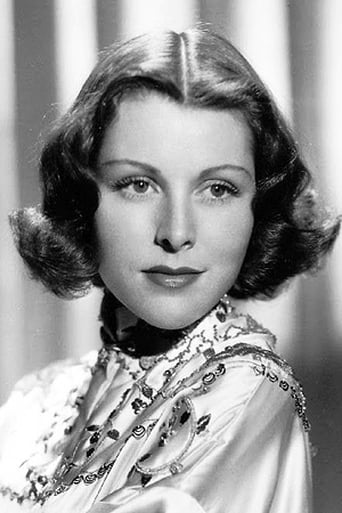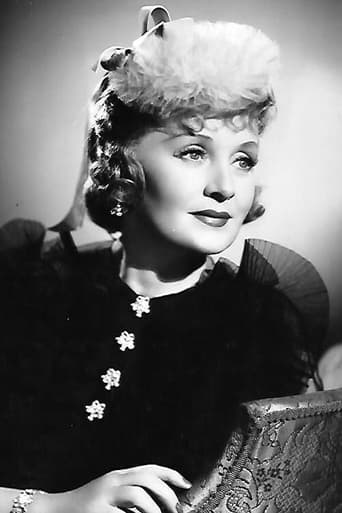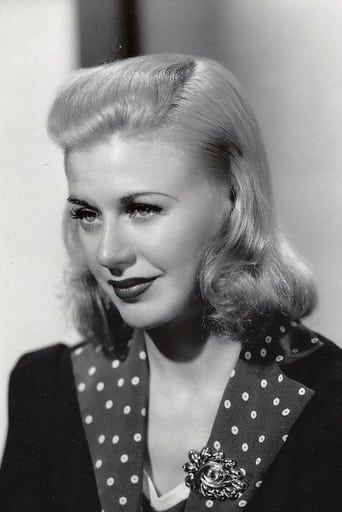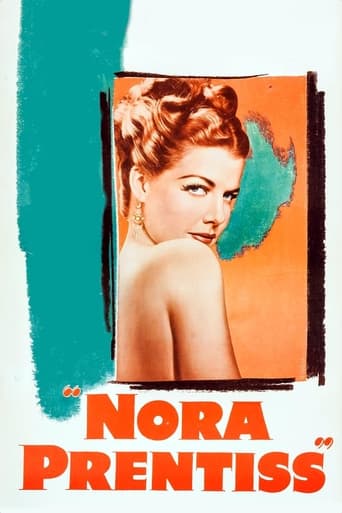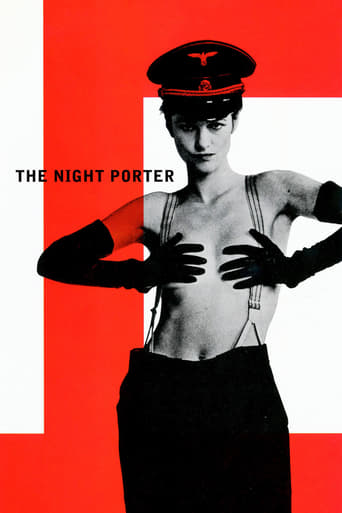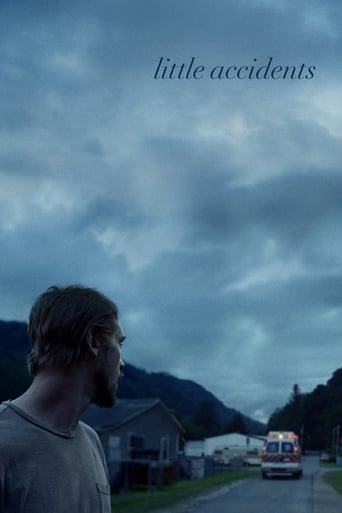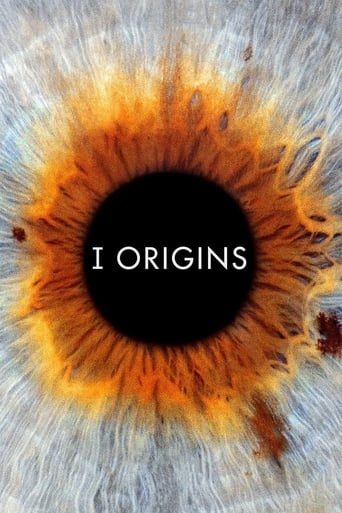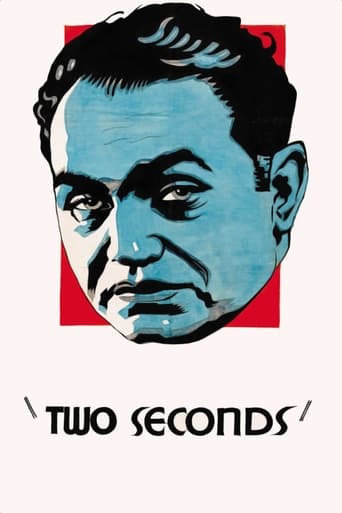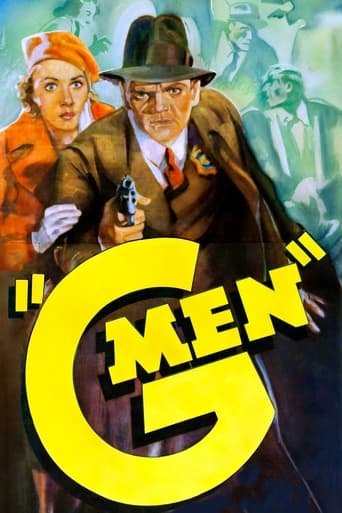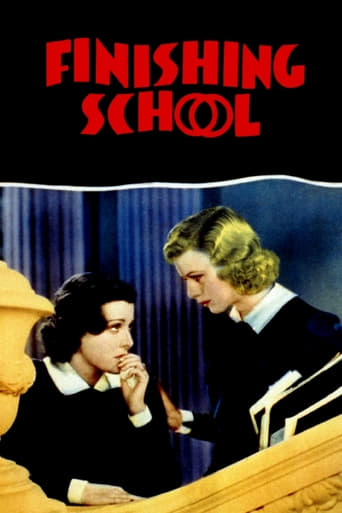
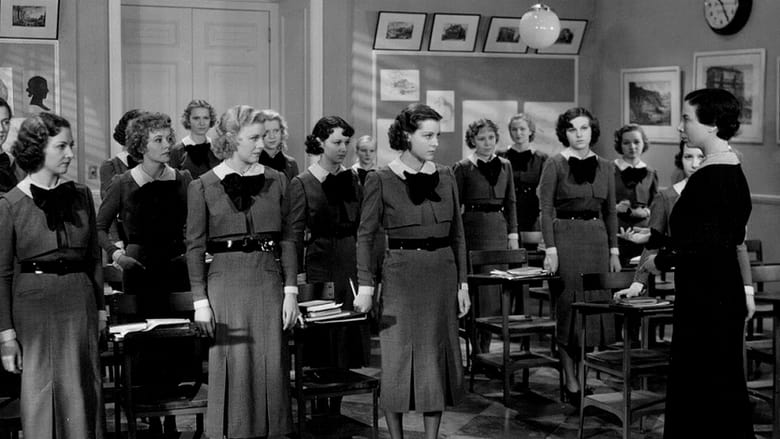
Finishing School (1934)
Virginia, who studies at a boarding school for upper-class girls, falls in love with a medical intern who works as a waiter for a living. Both the director of the school and her mother oppose such a relationship.
Watch Trailer
Cast
Similar titles
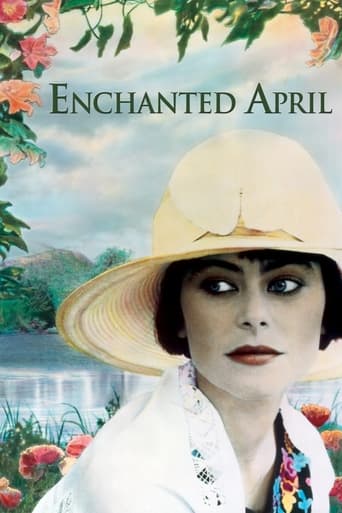
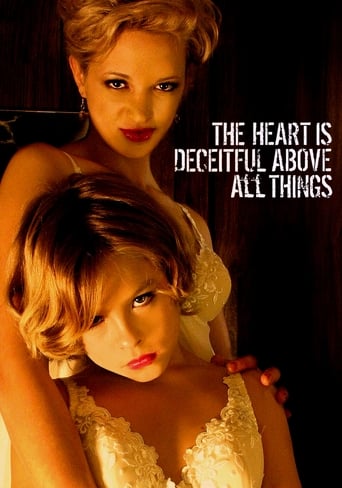
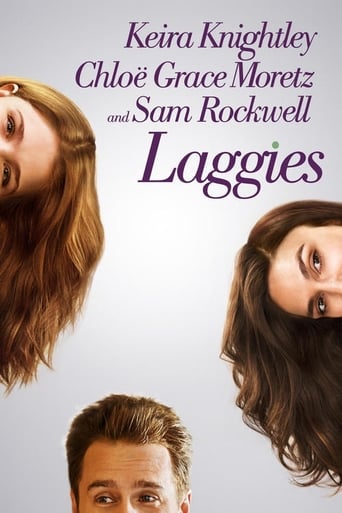
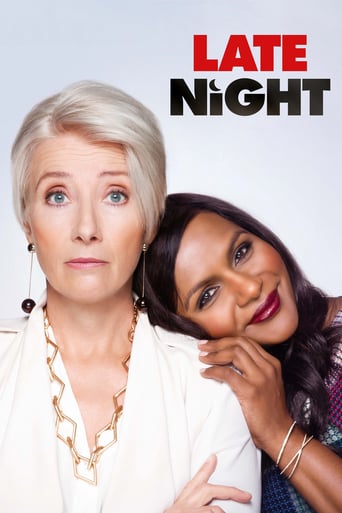
Reviews
Absolutely Fantastic
If the ambition is to provide two hours of instantly forgettable, popcorn-munching escapism, it succeeds.
The film creates a perfect balance between action and depth of basic needs, in the midst of an infertile atmosphere.
A terrific literary drama and character piece that shows how the process of creating art can be seen differently by those doing it and those looking at it from the outside.
Sound familial advice, indeed, but what I find most interesting about FINISHING SCHOOL is the contrasting character study it gives us between roommates Virginia (Frances Dee) and Pony (Ginger Rogers). Though quickly establishing a close friendship, they possess almost polar opposite personalities. Virginia is extremely high strung, as can be seen almost immediately. She spasmodically breaks a liqueur bottle to avoid breaking school rules even at the price of alienating her new schoolmates. When her boyfriend Mac (Bruce Cabot) is rudely turned away from a Sunday Tea at Crockett Hall, Vergie explodes rather unfairly at a young man to whom she's introduced at the social function. Later at her Christmas rendezvous with Mac, she tearfully asks him, no, she begs him to reassure her that she's really a "good" girl no matter what her teachers (Beulah Bondi) say. And at the end, her predicament drives Virginia to the verge of suicide. She's a girl who takes things very seriously, often too seriously for her own good.Her friend Pony, on the other hand, shows a devil-may-care attitude towards anything she encounters. School rules to her are not only made to be broken, this is actually the expected behavior from the girls. During their wild weekend in New York, Pony confidently tells her friend to "make the rules" and the football player will listen to them. It's no doubt true of Pony herself, but her innocent friend is completely at sea as to how to handle this aggressive young man (btw, exactly what has happened to Pony when Virginia is molested by the guy?). Much the same happens at the end when Virginia becomes frantic and hysterical at not hearing from Mac for a week while Pony immediately does the obvious and sensible thing by calling Mac on the telephone to explain to him the situation. It's not that Virginia isn't bright enough, it's that she's the kind to let her feelings overwhelm her, something that Pony would never do.Spoiler alert: I was rather embarrassed my first viewing of this film when I didn't figure out that Virginia was pregnant until she refused to be examined by the doctor (or was she just a nurse?). I understood that she'd slept with Mac in the boathouse that night, but I was thinking that Virginia's rising hysteria was just an overreaction to his apparently dumping her afterwards. Reading a few reviews of the movie told me that quite a few people never do pick up on the fact that she was pregnant. I still feel foolish, but perhaps a touch less so.It's a little strange to see Bruce Cabot in such a sympathetic role. He does well with it, though the character itself might be described as a bit too good to be true. Ginger Rogers is perfect as the sassy, somewhat rebellious schoolgirl, and is aided by having most of the best lines (though Billie Burke as Virginia's mother gets a few zingers as well), but the movie belongs to Frances Dee, who gives an exceptionally sensitive performance as an emotionally vulnerable adolescent going about the business of growing up. It's an interesting film from near the end of the Pre-Code era.
No need to repeat the plot. The year is 1934 and class issues have bubbled to the surface thanks to the Great Depression. The movie itself is not especially riveting, but does provide some interesting insights that I suspect are still relevant. The girls' school amounts to a confining etiquette center where upper-class girls learn the little social markers that will separate them from commoners. In short, the school consolidates ("finishes") the girls' elite status by teaching the rules that define their class and how the girls should behave within them. Above all, one unspoken lesson is that those untutored in the rules, namely common people, now stand as social (economic) inferiors. (Consider how the help is treated.) At the same time, the school presents itself almost like a prison—after all, among these girls, a good reputation upon marriage is crucial, implying among other desirable traits the absence of a rebellious streak.But, of course, as the movie shows, sex is the great equalizer. Animal spirits have a way of breaking down even the most rigid artificial barriers. Pony (Rogers) and her friends typify this biological reality; at the same time, the screenplay comes up with an unexpected twist—at bottom, the school lets the girls get away with these unchaperoned weekends so long as the school's reputation remains unaffected. In short, the school cares more about the business end than it does its stated mission. I suspect this cynical angle comes from a real life experience of one of the writers.In terms of the story, Virginia's (Dee) character is very well conceived. At the movie's outset, a rather uncaring Mom (Burke) abandons Virginia to the school's care. Right away we see that Virginia is a dutiful girl wanting to do the right thing and we're sympathetic. She's ready to obey the received rules, but, more importantly, she also has an instinctual sense of right and wrong as when she defies the rules by tearing up the incriminating note, thereby winning respect from the other girls. It's that depth of character taking shape that forms the movie's core.One key event is being accepted by Pony, which amounts to a liberating experience for Virginia. She can now act out some of her suppressed desires, such as getting "tight". But as the school knows, and Virginia discovers, acting out one suppressed desire can snowball. Thus, it's doubtful she would have made the pivotal decision to accompany her social inferior Ralph (Cabot) without Pony's influence and willingness to act instinctively. But, most importantly is how Virginia actually responds to Ralph. In another key scene, she responds to him as a person instead of as a stereotyped commoner as the school teaches. Thus she overcomes one of the school's central and most far-reaching rules. As her relationship with Ralph deepens, the tension between the rules of her elite class and her instincts becomes greater, until the final break when she leaves the school to marry Ralph. By that act, she finally breaks free of the class rules that would otherwise define her, and at the same time, becomes for the first time, her own person. At bottom, the film is about overcoming artificial barriers to discovering one's own freedom. In this case, Virginia must overcome the constraints of her class-bound background.I expect the movie resonated with audiences then, and still does. One point raised in the subtext is the clash between two foundational principles of American society, namely the occasional clash between capitalism and democracy. Capitalism works to create a class of wealthy asset owners, whose wealth confers privileges not shared by the non-wealthy. That class difference can harden into rivalry when those privileges become discriminatory and are passed onto fresh generations through institutions like finishing schools. If Virginia so chose, she could remain within the confines (rules) of her class and lead a comfortable life. But she doesn't. Instead, she responds to Ralph in democratic fashion, as an equal, along with all that implies. In effect, she thus chooses a democratic ideal over a consequence of capitalism, in a manner I'm sure audiences of the 30's found agreeable, and still do.The movie itself makes two key compromises that soften the implications. First, Ralph is made a doctor and not merely a waiter. Thus, Virginia marries a professional man and not a menial, which makes the union more socially acceptable. At the same time, however, it weakens the democratic challenge. A more challenging screenplay would not, I believe, make that key concession. The second compromise portrays Virginia's father (Halliday) as a somewhat implausible free spirit. Thus, the man representing capitalist privilege is presented as belonging in some fashion to the democratic camp and not to his wife's or Mrs. Alstyne's elitist faction. This concession fuzzes the line between the two conflicting ideals. More importantly for Virginia, it suggests she will not be banished from the family for marrying outside her class. This allows for a more complete happy ending through the possibility of reconciliation down the line. Nonetheless, the school with all its societal implications remains intact.The movie itself is not as interesting as the subtext. Despite good work by the cast principals, the direction remains flat and uninspired—perhaps the result of having two directors instead of one. Plus, the effort at not being explicit about Virginia's pregnancy is awkward, to say the least. Nonetheless, no movie that defies censorship by addressing a common human problem can be without merit. The movie may be obscure, but its themes endure.
Melodramatic film that basically tells the story of a girl who gets out from under the thumb of her wealthy, thoughtless, overbearing yet absent mama (Billie Burke) and under the influence of her new chums at Crockett Hall, an exclusive finishing school for young ladies ("the choice of first families for fifty years"). Virginia Radcliff (played by Frances Dee) is a gentle and sweet young lady who wants to follow, with all her heart, the set of rules put before her on her first day of school - no smoking, no drinking, no locked doors - and NO lipstick. Her wisecracking roommate, Cecilia (Ginger Rogers) aka "Pony" (she's just goofy about horses) thinks the "prissy" rules are just there to please the parents - and soon a couple of other gals are brawling on the floor of their room over a bottle of liquor! When Pony gets the girls out for a "weekend party" at a hotel by tricking the headmistress into thinking they are being escorted by her "aunt" (seedy actress who gets paid 5 bucks for the job) our good girl goes bad - she decides to get herself "tight" for the first time and they are soon boozing it up with a couple of shady fellows. But when Virginia can't handle her drink (or her creepy date) - the good-looking hotel waiter comes to her rescue, she's smitten, and is soon sneaking out of the school to see this guy. But trouble soon brews when our girl gets herself into another sort of "trouble" after her fellow meets her at the school's boat house - Virginia is soon butting heads with the snooty school headmistress who is mainly worried about the school's reputation.I found this to be an enjoyable, interesting film that starts out pretty light, but the story becomes much more serious towards the end. The trouble - pregnancy, is never mentioned being this was released in 1934 - they do everything but say the word to imply what is going on here though. The film features lots of top-notch performances that help keep the action rolling along - Frances Dee is excellent as the innocent good girl, Ginger Rogers is really fun to watch (as usual), and Billie Burke is in this film all too briefly, playing the sort of scatterbrained character that is typical for her. The school itself is actually introduced as a character known as "The Snob". And watch for a young Anne Shirley (aka Dawn O'Day) as a younger schoolmate, an innocent the older girls consider a pest - especially amusing is her scene where she asks Pony to borrow her brassiere. Quite a good film.
Think about it: a Frances Dee, Ginger Rogers, Billie Burke, Beulah Bondi, Anne Shirley, Jane Darwell, Bruce Cabot film banned by the Catholic Church in 1934 over a theme treated as considerably tame within a matter of decades.Finishing School (RKO-Radio 1934), produced in January and February of that year, opens with a frame of an application accepting Virginia Radcliff (Frances Dee) to Crockett Hall Finishing School, this dated September, 1933.For some reason, Mrs. Helen Crawford Radcliff (Billie Burke) neglected to send away her now-young-adult daughter to her alma mater until she decides to embark upon travels with Mr. Frank S. Radcliff (John Halliday), who appears rarely here, while being granted no say in disobeying his scatterbrained society matron, a quintessential of Miss Burke's film career.Upon her arrival at snobbish Crockett Hall (This institution is thusly billed as a character reminiscent of the Hawthornian Gothic novel), Virginia complaisantly agrees to heed the do's and don't outlined by stern and proper Miss Van Alstyne (Beulah Bondi, made up to appear elder than her current age and less sympathetic than her typical characters although Miss Bondi conveys a degree of likability in developing her character here).When Virginia is introduced to her new roommate, Cecilia "Pony" Ferris (Ginger Rogers), Virginia expresses surprise that Cecilia, along with the "in-crowd," Ruth Wallace (Marjorie Lytell) and Madeleine Kelly (Adalyn Doyle) not only know the ropes, but pull them at every possible turn. Young Billie (Anne Shirley, billed as Dawn O'Day) cries to fit in with this "mature" set, but remains largely overlooked (but accepted as a pal to Cecilia--a role which Miss Rogers fans come to admire).Cecilia sticks up for Virginia, who--to the dismay of Ruth and Madeleine--breaks the bottle of liquor which she had smuggled into Crockett Hall with the notion to conform to Miss Van Alstyne's edict.But after Virginia accompanies Cecilia and her "Aunt Jessica" (Irene Franklin) upon an outing to the city, the tables turn upon her desires to choose "right" over "wrong." As she attempts to escape the clutches of a forcible escort, a hotel night busboy, Ralph McFarland (Bruce Cabot), rises to the occasion of returning Virginia unto Crockett Hall, at which point both she and Ralph tread into steaming puddles back at the Finishing School campus, for doing what the viewer realizes is perfectly acceptable conduct.Dr. Ralph McFarland, an intern at a city hospital, exchanges barbs with Nurse Maude (Jane Darwell) and a milkman in this script resplendent with fast-paced wisecracking (also a hallmark of Ginger's character here) throughout much of this film, which efficiently segues into a subliminal study of Miss Dee's character, whose very mind proves a battlefield between right and wrong in near "Capraesque" fashion.P.S. In a dormitory scene, Ginger also performs a song which she has reportedly composed: "Never Hit Your Grandma with a Shovel."
